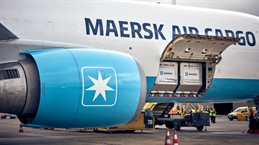
Maersk will begin implementing a Sustainable Aviation Fuel (SAF) surcharge amid the recently introduced ReFuelEU Aviation regulation of the European Commission.
ReFuelEU Aviation backs expanded SAF use, describing it as the "single most powerful tool" for reducing aviation CO₂ emissions.
Maersk said in a customer advisory on August 1 that ReFuelEU Aviation mandates fuel suppliers delivering to European Union airports to blend a minimum percentage of SAF into their fuel supply.
This requirement begins at 2% in 2025 and will increase incrementally to 70% by 2050.
"Although the mandate applies to fuel suppliers, the associated costs are being passed on by airlines through SAF surcharges or adjustments to fuel-related charges," Maersk, who also operate a dedicated air freight carrier within its logistics ecosystem, Maersk Air Cargo.
It added that these changes may affect air freight pricing for shipments moving through airports in the European Union and the United Kingdom.
"To ensure transparency and maintain service continuity, Maersk will introduce a SAF surcharge on applicable air freight shipments," Maersk said. "This surcharge reflects the additional costs imposed by airlines and will be clearly itemised in our quotations and invoices."
The surcharge will be EUR 0.04 per chargeable kilogram.
Meanwhile, Maersk clarified that for customers using our ECO Delivery Air product, the SAF surcharge will not apply as this solution offers greenhouse gas (GHG) emissions savings through a book & claim model.
"We are actively engaging with airline partners and monitoring developments to ensure fair and consistent pricing while minimising disruption to your supply chain," Maersk said.
It noted that customers may begin to see SAF surcharges applied to relevant air freight shipments from September 1, 2025, onward.
The ReFuelEU Aviation regulation is part of the Fit for 55 package to meet the emissions reduction target of 55% by 2030. It sets requirements for aviation fuel suppliers to gradually increase the share of SAF blended into the conventional aviation fuel supplied at EU airports.



